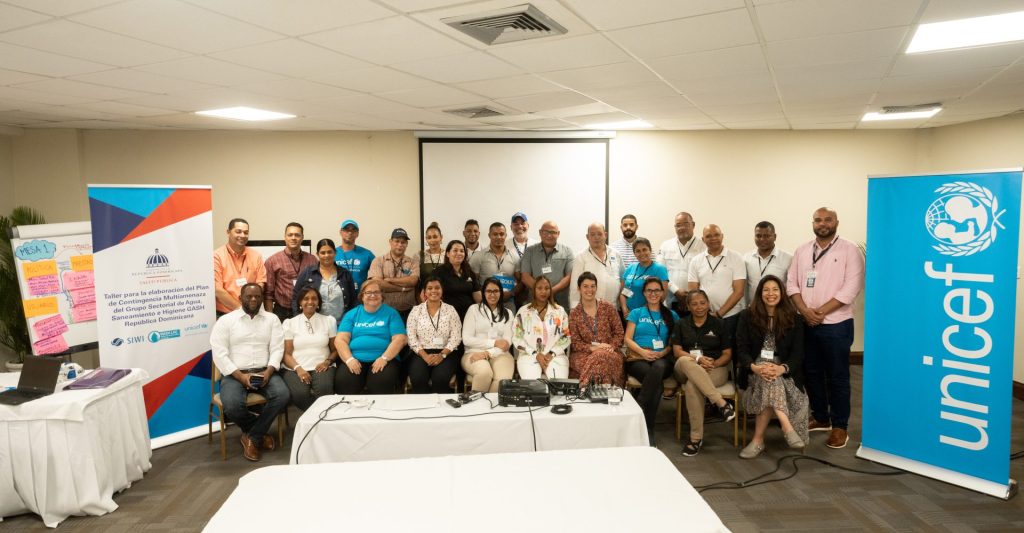SIWI conducts Multi-Hazard Contingency Plan Workshop in the Dominican Republic
The United Nations International Children's Emergency Fund (UNICEF) has sought SIWI's technical expertise to organize and conduct a workshop on Multi-Hazard Contingency Plan Preparation. The workshop aims to gather valuable inputs for the contingency plan of the WASH sectoral group, establish a roadmap and accountability framework, and deliberate on challenges and solutions for the successful execution of the proposed activities.

A total of 32 participants from the water, sanitation and hygiene Dominican Republic (WASH-DR) cluster participating institutions took part in the two-day workshop from 8-10 November 2022. Participants came from governmental institutions, corporations and nongovernmental institutions such as the Ministry of Public Health, the Ministry of Economy, Planning and Development, the Ministry of Education, the Ministry of Energy and Mining, the Aqueduct and Sewerage Corporation of Boca Chica, the Dominican Municipal League, the Dominican Red Cross, the Emergency Operations Center, the National Institute of Drinking Water and Sewerage, and the National Union of Firefighters, among others.
The workshop was carried out with adapted methodologies and tools. Participants were divided in three working groups (preparedness, emergency, and recovery), who participated as well in plenary sessions where the conclusions of each working group were shared and validated. During the first day, a presentation on the Dominican Republic´s climate and health risks assessment, including the multiple hazards analysis, latest events and impacts, was made highlighting the importance of the WASH-DR cluster; thereafter, participants worked in groups to: (i) implement the accountability triangle tool for service provision during a crisis, identifying the main actors, roles, relationships and responsibilities in the provision of WASH services for the specific group stage (preparedness, emergency, and recovery); and (ii) analyze the challenges in the relationships amongst those identified actors and the actions needed to overcome the challenges and to improve relationships.
On the second day, a presentation of the standardized preparedness and response plans (composed by four areas subdivided into strategic activities and sub-activities) was made, including the link to the six cluster core coordination functions. The preparedness, emergency, and recovery groups analyzed, discussed, defined, and prioritized the main strategic activities for each area, identifying environmental and/or health hazards for each prioritized strategic activity. This specific exercise was key for the following activities of the workshop, where participants identified for each prioritized strategic activity per group:
- current improvements,
- challenges for the implementation, and
- actions to mitigate those challenges for the implementation of each of the prioritized strategic activities in the preparedness, emergency, and recovery groups.
On the third and last day, each group worked on an action plan to identify actions and mechanisms for the implementation of the strategic activities in the preparedness, emergency, and recovery stages, which would serve as inputs to define the WASH-RD cluster multi-hazard contingency plan. As a result of the workshop, each group defined a maximum of three sub-activities, identifying the main responsible parties, and an estimated budget per activity in the local currency.
To close the workshop, UNICEF discussed the next steps in the preparation of the Multi-hazard Contingency Plan, highlighting the importance of an active participation of the WASH-RD institutions and focal points during the following steps.
Overall, the results of the WASH-DR Cluster´s Multi-hazard Contingency Plan Preparation Workshop are key to define an objective contingency plan for the short, medium, and long-term periods, including the essential actions and responsibilities that must be taken within organizations.
Holding the workshop with the WASH-RD cluster institutions and their respective focal points as participants, reinforced the importance of their active engagement and contribution to prepare the multi-hazard contingency plan, define roles and responsibilities. In addition, estimating budgets for the preparedness, emergency and recovery stages of a crisis or disaster was also crucial for a better coordination process in terms of foresight and management.







